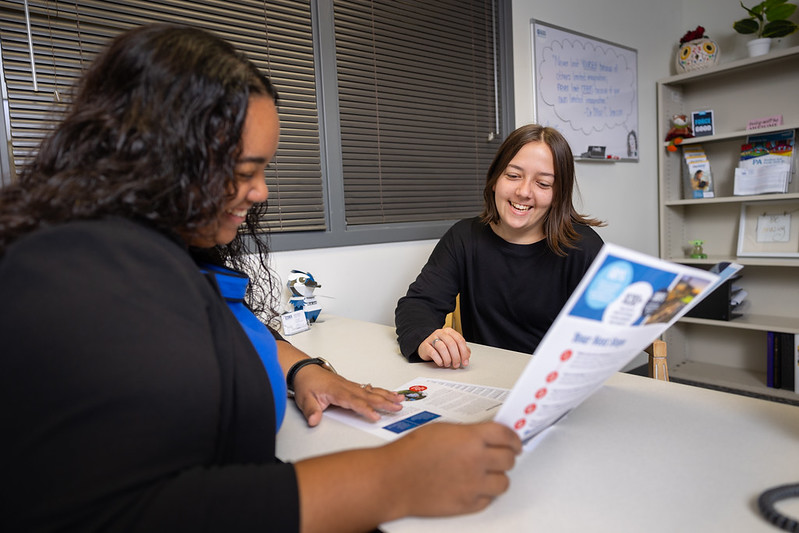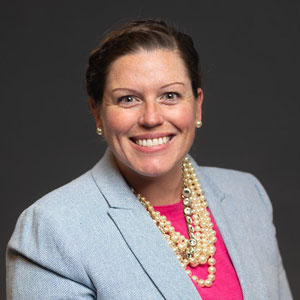Office of Financial Aid
Financial Aid at Elizabethtown College
The Office of Financial Aid at Elizabethtown College is here to support you with all your financial aid needs. We encourage students and families to reach out to us anytime you have questions or need assistance — we're here to help!
We provide information on institutional, federal, state and private aid options, debt management, and financial aid counseling. Appointments may be scheduled during our office hours. Students on clinical rotations may request an appointment outside of regular business hours to accomodate clinical rotation schedules.
Contact Financial Aid View the Financial Aid Handbook
Office of Financial Aid
Zug Memorial Hall, Room 208
Monday - Friday | 9 a.m. - 4 p.m.
Contact: finaid@etown.edu | 717-361-1404
Financial Aid Team

Jocelyn Martin
Director Of Financial Aid
Zug 208
717-361-1302
Hometown: I’m originally from Lancaster, Pennsylvania — a beautiful area full of rich history, great food, and a welcoming community. It’s a place that values both tradition and growth, and I’m proud to call it home.
Educational Background: I earned my Bachelor of Science in Global Business with a concentration in Marketing from Arizona State University. My time there gave me a strong foundation in international business principles and creative marketing strategies, and it helped shape my passion for working with students and supporting their success.
Favorite Food on Campus: Without a doubt, the chicken noodle soup! It’s my go-to comfort food on a chilly day or when I need a quick pick-me-up. There’s just something nostalgic and cozy about it that makes campus feel even more like home
Hobbies/Activities: When I’m not playing chauffeur to my kids for their various sports and activities, I love to slow down with a good book and soak up some sunshine. Whether it’s reading in the backyard or sitting outside with a coffee, I find peace in those small, quiet moments.
Advice for a Future Blue Jay: Get involved early and often! Join a club, attend an event, try something outside your comfort zone. These are the moments that help shape your college experience. You have the unique opportunity to design your own path — so be curious, be bold, and most importantly, enjoy the journey!
Favorite Local Spot: I love Knock Knock Boutique! It’s my go-to place when I need a fun gift or something unique. It’s full of personality and charm.
Why I Love Etown: Etown has such a vibrant and close-knit campus community nestled right in the heart of a charming little town. The people here genuinely care about each other, and you can feel it in every conversation and every corner of campus. It’s a place where students can grow, connect, and feel truly supported.

Molly Brandt
Associate Director of Financial Aid
Zug 208
717-361-1202
Hometown: Hanover, PA, but live in York, PA
Educational Background: York College of Pennsylvania (Bachelor of Science in Sport Management with a Minor in Marketing), Pennsylvania State University (Master of Science in Higher Education with a Concentration in Administration)
Favorite Food on Campus: The Marketplace dessert section!
Hobbies/Activities: Spending time with my family, cheering on Penn State football, the Philadelphia Eagles and Phillies, and binge-watching the Bravo TV channel.
Advice for a Future Blue Jay: Get involved! There are so many organizations and events Etown offers. College is the best time to branch out and try new things! You’ll meet new people and feel connected to campus.
Favorite Local Spot: The Spot Hometown Deli – great sandwiches!
Why I Love Etown: The beautiful campus!

Lindsey Barton
Assistant Director of Financial Aid (FosterEd Point of Contact)
Zug 208
717-361-1201
Hometown: Pottsville, PA
Educational Background: Bachelor of Science in Secondary Education with a concentration in Social Studies (Millersville University)
Favorite Food on Campus: Ramen from the Fresh Nest, or an Egg Jay from the Jay’s Nest!
Hobbies/Activities: Reading, Gaming, Thrifting, Spending time with family and friends
Advice for a Future Blue Jay: Be yourself but be open to new ideas and experiences! Etown is an amazing place to discover new passions and try new things, all while being true to yourself.
Favorite Local Spot: The Spot Deli and Prussian Street Arcade
Why I Love Etown: Stepping foot on campus, you are met with some of the friendliest people you will ever meet. In short, Etown feels like home away from home.

Carolina Concepcion
Financial Aid Counselor
Zug 208
717-361-1290
Hometown: Queens, NY
Educational Background: BA in History (CUNY Queens College), Strategic Leadership Graduate Certificate (Elizabethtown College)
Favorite Food on Campus: I have to say the Chicken Sandwich
Hobbies/Activities: I love doing crafts with my toddler. I love a family day at the museum or road trip to another city or state. On my down time I love to sit with a good book or play some video games.
Advice for a Future Blue Jay: My advice would be to be open to new experiences and new people. For me college provided an opportunity to meet and communicate with people with different life experiences and it increased my view/understanding of the world.
Favorite Local Spot: I love Whirli-Gig. It is too easy to get lost in there.
Why I Love Etown: I love the Etown community. The town is quaint, and it is easy to get to know the people of the community. Even events like the Second Friday in the square where you get to participate in fun activities with friends or family. The Etown Campus makes me feel at home. I have gotten to know so many people that truly feel like friends to me. I absolutely love it!

Elizabeth Hafer
Associate Director of Financial Aid
Zug 208
717-361-1344
Hometown: South Plainfield, New Jersey
Educational Background: Bachelor of Arts in Secondary Education from Kean University and a Master of Arts in Public History from LaSalle University
Favorite Food on Campus: An omelet from the Marketplace.
Hobbies/Activities: Gardening, reading, spending time with my husband and daughter, and walking/hiking.
Advice for a Future Blue Jay: Take advantage of all the diverse opportunities available to you at Etown and make the most of your time here!
Favorite Local Spot: The Spot – Amazing BLTs!
Why I love Etown: The incredible sense of community. Everyone exudes warmth and friendliness that makes Etown feel like a second home!

Kristin Mott-Kuntz
Administrative Assistant
Zug 208
717-361-1429
Hometown: I grew up in Maytown, PA, after spending some time in Knoxville, TN and Richfield, PA. I settled with my family in the Elizabethtown/Hershey Area.
Educational Background: Bachelor of Science in Bible with emphasis on women’s ministry and counseling (Lancaster Bible College)
Favorite Food on Campus: Homestyle meals from the Marketplace
Hobbies/Activities: Playing family games with my large family (7 kids), creative pursuits including photography, service opportunities in my church
Advice for a Future Blue Jay: College is a place of growing—growing in knowledge, growing in wisdom, growing in relationship to self and others. Growing takes time and isn’t always easy, but there is always someone/somewhere to find help in the growing pains. Find those resources and lean on them.
Favorite Local Spot: EBIC Church—it is a place of community with activities throughout the week for all age groups.
Why I Love Etown: Etown is a cute town with an active community. The culture includes community events at parks and downtown, and holiday parades.

Jennifer Stark
Financial Aid Assistant
Zug 208
717-361-3759
Hometown: Frederick County, Maryland
Educational Background: Bachelor of Science in Exercise Science (Slippery Rock University), Master of Arts in Teaching (Salisbury University)
Favorite Food on Campus: Cookies at the Marketplace
Hobbies/Activities: Walks with my two Boston terrier pups, pickleball, and watching my sons play soccer
Advice for a Future Blue Jay: Get involved in activities, clubs and campus events. Etown offers many opportunties for students to meet new people and enjoy free time outside of the classroom.
Favorite Local Spot: Whisk Cafe
Why I Love Etown: It's nice to live in a small, quiet community that is close to areas like Hershey, Harrisburg and Lancaster to explore on the weekends.
Financial Aid Timeline
Please note that this timeline only applies to traditional undergraduate students. Students enrolled in the School of Graduate and Professional Studies can view additional information.
Fall semester bill sent by the Business Office. Bills are due August 1. Contact the Business Office or Financial Aid with questions or concerns.
Have questions about School of Graduate and Professional Studies Financial Aid and Tuition?
Announcements
Exit Counseling
The Federal government
requires all graduating Federal Direct Loan borrowers to complete Federal student loan exit counseling. Exit counseling helps student loan borrowers prepare to repay their Subsidized, Unsubsidized, Perkins, and/or Graduate PLUS Direct Loans. Before completing this, please read the Exit Counseling - Guide for Etown Graduates to get a general overview of the exit counseling process. The Loan Repayment Presentation
is a great resource to learn about available repayment plans. Direct Loan exit counseling must be completed online by logging in to your FSA account at studentaid.gov. Perkins exit counseling must be completed online at
uasconnect.com.
Students must complete exit counseling. Please contact the Office of Financial Aid with any questions at finaid@etown.edu or 717-361-1404.
The Office of Financial Aid primarily communicates via the student's Elizabethtown College email address. Students should regularly check their Etown email for important financial aid information and updates.
We would like to remind everyone to remain vigilant against student loan forgiveness scams. Actors behind these scams will contact victims at random and promise to pay off the outstanding balance on their student loans. The actor will likely request the victim’s Federal Student Aid (FSA) username and password, personally identifiable information (PII), and payment, whether it be an upfront cost or monthly fee.
Legitimate student loan forgiveness programs offered by the Department of Education are free for applicants through their student loan provider (
https://studentaid.gov/manage-loans/forgiveness-cancellation
). The Department of Education also offers free services to help lower student loan payments (
https://studentaid.gov/manage-loans/repayment/plans/income-driven
).
If someone at your institution feels that they have fallen victim to a student loan forgiveness scam, please follow the steps below.
- Share the scam with the NCFTA and other member institutions
- Change the FSA ID and password immediately
- Contact loan servicers to revoke any power of attorney or third-party authorization
- Contact bank or credit card company and request that payments to the student loan debt relief company be stopped
- File a complaint with the FTC at identitytheft.gov
Frequently Asked Questions
General Financial Aid Information
The name of your financial aid counselor is listed on the Student Aid Portal under the Documents and Messages tab.
You can view your Financial Aid Information on your Student Aid Portal .
The Student Aid Portal login is your 7-digit student ID number without the EC#. If you are accessing this portal for the first time select first time user and follow the prompts. If you forgot your password, click on the “Forgot Your Password.” Please keep in mind that three unsuccessful attempts at logging in will automatically lock your account and you will have to contact the Office of Financial Aid to unlock it.
Use of Legal Name is required in communications and processes due to business or legal requirements and/or system limitations which legally necessitate the use of a Legal Name. However, whenever reasonably possible, a student’s Preferred/Chosen Name will be used.
After receiving your financial aid offer, you must log into your Student Aid Portal and accept or decline your awards first.
Managing Financial Aid & Loans
Send us an email stating such, (vice versa if wanting to accept loans that were previously declined).
Visit My Federal Student Aid to view your federal student loan history and find out whom to make your loan payments.
Once you have accepted your Federal Student Loans (Subsidized/Unsubsidized), if you are a first time borrower, you must complete Loan Entrance Counseling and the Loan Master Promissory Note in order for those funds to disburse to your student account. Both requirements must be completed on www.studentloans.gov by logging in with your StudentAid.gov account (same login as the FAFSA). The Loan Entrance Counseling provides you with information to ensure that you understand the responsibilities and obligations of borrowing a Direct Stafford Loan. The MPN is a legal document in which you promise to repay your federal student loan(s) and any accrued interest and fees to your lender/loan holder.
Parents whom applied and are approved for the Parent PLUS Loan with or without an endorser must complete a Parent PLUS Loan MPN. Those approved with an Endorser must complete a new MPN for each new loan awarded.
Contact your student loan servicer to request a Loan Deferment or Forbearance . These two options could temporarily postpone or reduce your federal student loan payments. Your student loan servicer can also discuss other repayment plan options such as income-driven repayment plans or consolidation. Visit NSLDS for your loan servicer’s contact information.
Financial Aid Requirements & Documentation
Should the Office of Financial Aid require additional documents, students are contacted via email, mail and/or phone informing him/her of the documents needed. You can also see what documents are needed on the Documents tab on the Student Aid Portal .
One in three students whom complete the FAFSA are selected by the Department of Education for Verification. Ve rification is a process used to verify certain information on the FAFSA to ensure its accuracy. This is an additional step, which the institution must complete prior to disbursing the student’s financial aid. In order to complete the Verification process we would request a Tax Transcript, a Verification Worksheet, and/or other verification documents. If you are selected for verification, we will contact you directly and provide you with additional information as to what we would need.
All students who have received Direct Subsidized / Unsubsidized / or Graduate PLUS loans must complete Exit Counseling online at www.studentloans.gov. Students who received a Perkins loan will receive Exit Counseling instructions from our loan servicer, UAS, by email. Our office also hosts Exit Counseling workshops on campus in December and April to help students complete the exit counseling process.
FAFSA & Related Policies
Yes, the FAFSA needs to be completed every year. Check the FAFSA Simplification page for more information about timing.
The Free Application for Federal Student aid (FAFSA) uses tax information from two years prior. Using two-years prior tax information on the FAFSA (as opposed to one-year prior information) increases the form’s accuracy and allow families to make more informed college & financial aid decisions.
The Student Aid Index (SAI) is a number that's used to determine eligibility for need-based aid. It is calculated using information that the student (and contributors, if required) provides on the FAFSA form. The SAI will replace the Expected Family Contribution (EFC) starting in the 2024–25 award year. A student's SAI can be a negative number down to –1500.
To calculate a Student Aid Index (SAI) , a need-based analysis is conducted. The analysis takes into account the income and assets of the student and their parents or spouse, if applicable. The analysis formula used considers both taxed and untaxed income, as well as any assets and benefits received, such as unemployment or Social Security.
On the FAFSA form, a contributor refers to anyone (student, student's spouse, a biological/adoptive parent, the parent's spouse) who's required to provide information on the FAFSA form. Refer to this infographic from Federal Student Aid to help identify the contributor on your FAFSA.
The custodial parent(s) on the FAFSA will be the parent(s) who provided the most financial support, instead of the parent(s) with whom the student lived more during the past 12 months. Students or parents will invite a contributor to complete their portion of the FAFSA form by entering the contributor's name, date of birth, SSN, and email address.
The Financial Aid Direct Data Exchange, replacing the IRS Data Retrieval Tool starting with the 2024–25 award year, will transfer contributors' federal tax information from the IRS directly into the FAFSA form.
Yes. U.S. Government savings bonds are reported as assets for the individual in whose name the bonds were taken out.
Yes, the value of certificates of deposit should be reported as an asset on the FAFSA.
The value of a 529 plan owned by a dependent student or one of their parents is considered a parental asset on the FAFSA. Any 529 plan that is owned by the dependent student's parent is reported as a parent asset on the FAFSA.
Assets, whether it be cash gifts or financial assets, under the Uniform Gifts to Minors Act (UGMA) or the Uniform Transfers to Minors Act (UTMA) is established by a custodian, often an adult, to a minor (the student). Because the minor is the owner of the account, assets are counted toward the student's assets on the FAFSA.
Scholarship & Grant Information
Elizabethtown College does not offer institutional financial aid for summer classes. Students in the Fifth Year 4 + 1 Master’s Degree and Occupational Therapy Doctorate (OTD), and Physician's Assistant programs please see following link for more information: https://www.etown.edu/offices/financial-aid/handbook.aspx
To receive federal and or State financial aid for a minor, the student must declare the minor before completing their degree completion requirements, and those minor courses must be required to receive their degree. Institutional aid is awarded based on eligibility and or available funding.
No, Study abroad is not covered by Tuition Exchange unless your major requires it. However, if you decide to study abroad through an affiliated program and your major does not require it, you may be eligible for your original merit and/or institutional aid awarded.
A student’s room expense is an component of a student’s cost of attendance. So, the RA room waiver received must be considered as a resource in a student’s financial aid offer. The waiver is considered both institutional aid as well as estimated financial assistance (EFA) for federal financial aid purposes. Estimated financial assistance will transition to other financial assistance (OFA) effective for the 2024-2025 award year and forward. If a student has need based institutional aid (Trustee), their Trustee will typically be reduced.
Satisfactory Academic Progress (SAP)
Satisfactory Academic Progress (SAP) is required for all students interested in receiving federal financial aid. SAP is evaluated at the end of each term. Students are required to maintain a minimum cumulative GPA , complete a minimum percentage of classes attempted and complete their degree program within a maximum timeframe. Please see complete SAP policy for more information here .
Incomplete grades (“I”) do not affect a student’s cumulative GPA for SAP, but count as credit hours attempted toward both completion rate and maximum time-frame SAP requirements. An incomplete grade counts as credit hours attempted but will not count as credit hours completed/earned until a permanent grade has been assigned. It is the student’s responsibility to inform the Office of Financial Aid of all grade changes (ex. from “I” to “B”) to ensure that their SAP status is reviewed. Deadlines for incomplete grades are posted on the Registration and Records webpage.
A full-time student (24-36 credits per academic year) must successfully advance at least 24 credits in the two preceding semesters (summer academic work, where applicable, may be included). Incompletes, withdrawals, course repetitions and non-credit remedial courses are not counted. Repeat F’s are not counted in the semester when first received; Repeat D’s and C’s are not counted in the semester when repeated.
Financial Aid Eligibility & Enrollment
A student must be enrolled on a full-time basis in the traditional daytime program (12–18 credit hours a semester) to be eligible for all institutional financial assistance. Students who enroll for less than 12 credit hours in a semester may still be eligible for funding from State and Federal programs.
Students cannot receive federal financial aid for courses that will not count towards the completion of that student's degree program requirements. Students should consult with their advisor to ensure enrollment in courses will count toward their degree completion.
Merit-based aid is limited to up to eight semesters (up to 10 semesters for 4+1 Master's Degree Programs). Institutional aid for subsequent semesters is solely based on demonstrated need.
Changes in family circumstances, such as an increase or decrease in parents’ or student’s income, assets, family size, number of family members attending college, may affect eligibility for financial aid. If the family’s circumstances do not change significantly over the four years, the financial assistance should be comparable each year. Merit scholarships eligibility will retain their original values all four years provided the student remains in good academic standing and has a favorable disciplinary record. Students are required to review and accept/decline their financial aid offer on the Student aid Portal .
Special Circumstances & Financial Changes
If the tax information that you entered in the FAFSA does not reflect the current financial situation for the student and/or family, contact the Office of Financial Aid to discuss your circumstance with your Financial Aid Counselor.
Living off-campus typically costs less than living on campus. Living off-campus (such as sharing an apartment) is also different from being a commuter (living with parents). Changes to your housing status will reduce your cost of attendance (COA) and your demonstrated need and subsequently your financial aid award. It is important that you consult with the Office of Financial Aid before changing your housing status. You will also need to follow the appropriate procedures provided by Residence Life .
Your financial aid awards may be reduced or canceled if you fail to maintain required credit enrollment. Dropped courses may also affect Satisfactory Academic Progress . It is important that you speak with the Office of Financial Aid before reducing your credit load or changing course-grading options to audit.
During zero-credit co-op semesters, students are charged $500 administrative fee and are registered for a zero-credit course. Scholarships and grants are deferred during co-op semesters. Financial aid is not awarded during zero-credit co-op semesters. During 12-credit co-op semesters, students are charged regular tuition rates and are eligible to apply for financial aid. Any student participating in the co-op program should notify the Office of Financial Aid as soon as possible.
The College determines enrollment status based on credit load. In-school loan deferment eligibility is based on having an enrollment status of at least “half time” (six credits for undergrad and three credits for graduates). Notify the Office of Financial Aid prior to the start of your internship, fieldwork, or co-op to discuss any implications that it may have on financial aid eligibility and student loan repayment. We can provide guidance and help locate specific resources as it relates to your individual financial aid offer. Locate the name of your financial aid counselor on your Student Aid Portal, email us at finaid@etown.edu. or call 717-361-1404.
On campus positions are posted on the college's Student Employment Website . All students must interview for their prospective positions and are encouraged to complete employment forms upon entering college so they are able to begin work at any time during their enrollment at Elizabethtown College. Students must complete an I-9, W-4, Direct Deposit Authorization form, and Workers Compensation form before working on campus. Please click here for additional FAQs.
All questions can be directed to:
Mailing Address:
Elizabethtown College
Office of Financial Aid
1 Alpha Drive
Elizabethtown, PA 17022
Office of Financial Aid
Phone: 717-361-1404
Fax: 717-361-1514
finaid@etown.edu
